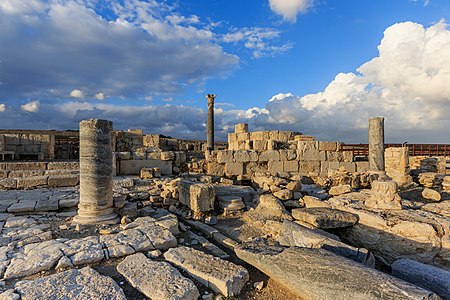Portal:European Union
Introduction
The European Union (EU) is a supranational political and economic union of 27 member states that are located primarily in Europe. The Union has a total area of 4,233,255 km2 (1,634,469 sq mi) and an estimated total population of over 448 million. The EU has often been described as a sui generis political entity (without precedent or comparison) combining the characteristics of both a federation and a confederation. Containing 5.8% of the world population in 2020, EU member states generated a nominal gross domestic product (GDP) of around US$16.6 trillion in 2022, constituting approximately one sixth of global nominal GDP. Additionally, all EU states except Bulgaria have a very high Human Development Index according to the United Nations Development Programme. Its cornerstone, the Customs Union, paved the way to establishing an internal single market based on standardised legal framework and legislation that applies in all member states in those matters, and only those matters, where the states have agreed to act as one. EU policies aim to ensure the free movement of people, goods, services and capital within the internal market; enact legislation in justice and home affairs; and maintain common policies on trade, agriculture, fisheries and regional development. Passport controls have been abolished for travel within the Schengen Area. The eurozone is a group composed of the 20 EU member states that have fully implemented the economic and monetary union and use the euro currency. Through the Common Foreign and Security Policy, the union has developed a role in external relations and defence. It maintains permanent diplomatic missions throughout the world and represents itself at the United Nations, the World Trade Organization, the G7 and the G20. Due to its global influence, the European Union has been described by some scholars as an emerging superpower. In 2012, the EU was awarded the Nobel Peace Prize. The United Kingdom became the only member state to leave the EU, in 2020; ten countries are aspiring or negotiating to join it. (Full article...) Selected article The Treaty of Lisbon or Lisbon Treaty (initially known as the Reform Treaty) is an international agreement which amends the two treaties which form the constitutional basis of the European Union (EU). The Lisbon Treaty was signed by the EU member states on 13 December 2007, and entered into force on 1 December 2009. It amends the Maastricht Treaty (also known as the Treaty on European Union) and the Treaty establishing the European Community (TEC; also known as the Treaty of Rome). In this process, the Rome Treaty was renamed to the Treaty on the Functioning of the European Union (TFEU). Prominent changes included the move from unanimity to qualified majority voting in several policy areas in the Council of Ministers, a change in calculating such a majority to a new double majority, a more powerful European Parliament forming a bicameral legislature alongside the Council of ministers under the ordinary legislative procedure, a consolidated legal personality for the EU and the creation of a long-term President of the European Council and a High Representative of the Union for Foreign Affairs and Security Policy. The Treaty also made the Union's bill of rights, the Charter of Fundamental Rights, legally binding. Selected picturePhotograph credit: Alexander Savin Kourion is an ancient city-state on the southwestern coast of the island of Cyprus, located near modern Limassol, that existed from antiquity until the Middle Ages. Built in the 12th century BC by Mycenaeans who took part in the Trojan War, Kourion was later controlled by the Greeks, Romans, and Byzantines. The settlement was placed on a 70-metre-high (230 ft) cliff to ensure the safety of its citizens. The modern archaeological site is managed by the Department of Antiquities of Cyprus and includes the ruins of the stadium and the sanctuary of Apollo Hylates. This photograph depicts the ruins of Kourion's agora, a central public space in the city-state.
Did you know?...that within the Eurozone the European Central Bank has the exclusive authority to set monetary policy? ...that Greenland and United Kingdom are the only countries to ever leave the European Union? Selected cityThe city of Luxembourg, commonly known as Luxembourg City, is a commune with city status, and the capital of the Grand Duchy of Luxembourg. It is located at the confluence of the Alzette and Pétrusse rivers in southern Luxembourg As of 2005[update], the commune of Luxembourg City has a population of 76,420, which is almost three times the population of the second most populous commune. The city's metropolitan population, including that of surrounding communes of Hesperange, Sandweiler, Strassen, and Walferdange, is 103,973. Luxembourg City lies at the heart of Western Europe, situated 188 km (117 miles) from Brussels, 289 km (179 miles) from Paris, 190 km (118 miles) from Cologne. Luxembourg City is one of the wealthiest cities in the world, having developed into a banking and administrative centre. Luxembourg is a seat of several institutions of the European Union, including the European Court of Justice, the European Court of Auditors, and the European Investment Bank. General imagesThe following are images from various European Union-related articles on Wikipedia.
TopicsFeatured contentFeatured articles
Featured lists
Featured contentGood articles
CategoriesRelated portalsAssociated WikimediaThe following Wikimedia Foundation sister projects provide more on this subject:
Discover Wikipedia using portals |
































































